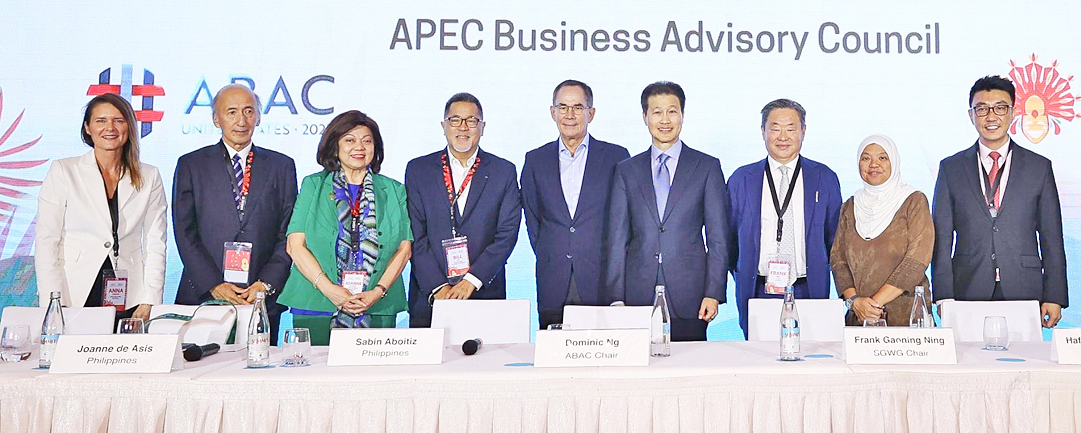The APEC Business Advisory Council (ABAC) recently stressed the need for action in an increasingly fragmented and challenging operating environment during a meeting in Cebu, the Philippines.
“Our theme this year is ‘Equity, Sustainability, Opportunity’. Achieving these goals has never been more vital, nor more challenging, as we face ongoing economic instability, grave climate impacts and disruption from emerging technologies such as generative artificial intelligence,” said 2023 ABAC Chair Dominic Ng.
The Chair explained that ABAC had finalised its recommendations to APEC Leaders, which it would present formally to the Leaders at their meeting in San Francisco in November. It also prepared detailed recommendations for ministers of finance, health, food security, women, and small businesses.
President Ferdinand Marcos Jr opened the meeting on July 28 with an address highlighting the importance of public-private sector collaboration in tackling the Asia-Pacific region’s major challenges. Opening remarks from Secretary for Trade and Industry Alfredo Pascual stressed the importance of working together on economic integration and trade facilitation, including in the WTO.
“In our report to Leaders, we have identified a range of concrete actions that would advance equity by making it easier for groups with untapped economic potential, including micro, small and medium-sized businesses, women and Indigenous entrepreneurs, to engage in commerce. We have also developed a ‘dynamic toolkit’ to boost supply chain resilience, drawing on the lessons of the disruptions of the last few years, which will be an important resource for small businesses,” noted Ng.
“Recent heatwaves in North America highlight the need to prioritise responses to the climate crisis and other sustainability challenges,” the Chair said, noting that the world experienced the hottest week in recorded history earlier in July.

“Market-based policies, trade in environmental goods and services and renewable energy, and initiatives that leverage private sector capital, ingenuity, and leadership have considerable promise, but policymakers also need to act urgently to reduce emissions, adapt to a low-carbon economy and energy, and ensure a just transition for all in our communities.” ABAC will keep a close watch on the development of carbon border adjustment measures, on which it commissioned a report this year, and remains wary of the potential impacts of ‘green protectionism’.
ABAC also recommended boosting economic opportunities by fostering a more seamless business environment, including continuing to work towards a Free Trade Area of the Asia Pacific.
“Besides getting the trade policies right, digital technologies will be key. We have developed some important action points on paperless trade and financing, cybersecurity, and other areas”. He added that ABAC calls for new policies to increase women’s participation in STEM careers. “This makes sense, not only for greater inclusion but also better digital outcomes.”
“We also discussed the emergence of generative artificial intelligence. This raises new concerns about ethical governance, responsible development, and workforce impacts, along with potential economic and productivity gains,” he added.
“Policymakers are scrambling to respond – the business community needs to be part of the conversation.” Ng expressed his gratitude to ABAC Philippines colleagues, led by Sabin Aboitiz, for hosting the meeting and creating opportunities for ABAC delegates to engage with senior government representatives from central and local government agencies and entrepreneurs and business leaders from Cebu.
“The Third ABAC Meeting is the culmination of work set out by ABAC 2023 on ‘Equity, Sustainability, Opportunity’. Leading into the Third APEC Senior Officials’ and Ministerial Meetings (SOM3) in Seattle, Washington, ABAC Brunei has been spearheading a pilot initiative on developing an Environmental, Social, and Governance (ESG) Framework for MSMEs, which we hope will encourage APEC to consider such initiatives as part of supporting MSMEs in ESG and sustainability practices within their enterprises,” said ABAC Brunei member Nik Hafimi binti Abdul Haadii, who is also the Chair of ABAC Inclusion Task Force and Executive Director of LVK Group of Companies. ABAC Brunei Darussalam member as Chair for ABAC Inclusion Task Force along with other ABAC Working Group and Task Force Chairs was part of the press conference held by ABAC 2023 Chair Dominic Ng upon conclusion of the third council meeting.
The ABAC meeting was preceded by a supply chain resilience capacity building workshop co-organised by ABAC United States and ABAC Philippines with support from the Cebu Chamber of Commerce and Industry. Nearly 200 representatives from Cebu-based companies attended the session to learn how to make their businesses more resilient in the face of uncertainty.


